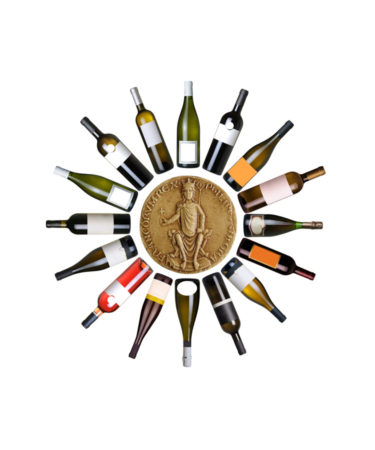Those who equate wine with sophistication and civility must not know about the Battle of the Wines.
Called La Bataille des Vins in its original French, this circa-1224 poem by Henry d’Andeli depicts an epic, wine-soaked battle royale. It’s rich with trash-talking clergy, nationalistic rivalries, and bathroom humor.
The hero of our story is King Philip Augustus of France, a real-life royal best known for ushering France out of feudalism and into medieval power. In d’Andeli’s verse, King Philip presides over an international wine competition. Producers from modern-day France, Spain, Germany, Cyprus, and beyond submit more than 70 wines, including Loire Valley Sancerre, Chablis from Burgundy, and Alsatian and Mosel varieties.
A fictional English priest judges the juice alongside King Philip. The priest adopts a pass/fail grading model, deeming each wine “celebrated” or “excommunicated.” He enjoys too much of the sacrament, though, and slurs his words.
Things get sloppy. The priest nicknames the submission from Champagne “Sir Fart” for its gaseousness. He degrades an Argenteuil wine, saying, “You son of a whore. You are playing to lose!” He also physically threatens those who offend him.
Eventually, like all bad drunks, the priest makes an inelegant exit.
“This English priest drinks so much he falls asleep, he falls dead drunk,” Francesca Sautman, a City University of New York professor and specialist in medieval French folklore, explains.
Sautman believes the priest’s characterization is indicative of 13th-century French attitudes toward the English — namely, that anyone who doesn’t make their own wine probably can’t hold their liquor. It precipitates centuries of discord between France and England.
As a result of his intoxication, the priest misses the victor of The Battle of the Wines. A dessert wine from Cyprus takes the day.
Our best guess for its identity is Commandaria, an amber-colored wine made from two indigenous Cypriot grapes, Xynisteri and Mavro. To produce its sweet palate, winemakers sun-dry the grapes and age the juice in oak for at least three years.
Commandaria has an ancient pedigree. It reportedly lubricated the Feast of the Five Kings, a 1363 dinner party hosted by Edward III in London and attended by international royalty. Richard the Lionheart drank Commandaria at his 1191 wedding, calling it the “wine of kings and the king of wines.”
How civilized.
